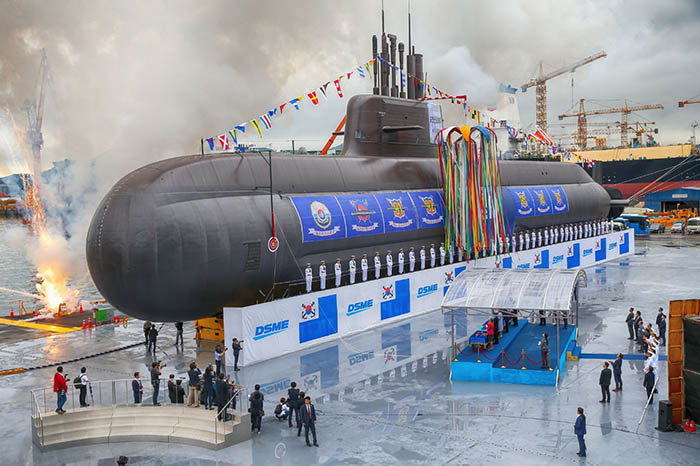The Ka Pa Sa looks like it has been set up near the Pauk factory where chemical weapons are stored.
Chemical weapons are also not bad option for the Tatmadaw.
Tatmadaw can fit chemical warheads in their SY-400, Hwasong 5 and other ballistic missile systems.
Chemical weapons are as deadly as nuclear weapons
Chemical weapons only affect living beings, vehicles and buildings are unaffected.
Unlike nuclear warheads that flatten entire cities.
Moreover weather conditions are a key factor. If the wind blows in the wrong direction, it can even backfire (see the ample examples from WWI, WWII, etc)!
Iran-Iraq War, and more recently in the Syrian battleground, chemical weapons have been used on a regular basis.
It can be countered as easily as with simple hazmat suits, therefore no real deterrence can be achieved. And no real strategic advantage either in using it.
Nuclear weapons are in another league.
This is so true, that even South Korea is following the nuclear WMD path.
South Korea plans underwater test of indigenous SLBM
January 13, 2021
SEOUL, Jan. 13 (Yonhap) -- South Korea is expected to carry out underwater tests of a home-grown submarine-launched ballistic missile (SLBM) this year, having concluded ground tests, a source said Wednesday.
South Korea is developing an SLBM based on the home-grown ground-to-ground Hyunmoo-2B ballistic missile with a flight range of around 500 kilometers. It will be used with envisioned 3,000-ton-class or larger submarines, according to defense officials.
"Related agencies wrapped up ejection tests of the missile on the ground last year. They are to move on to the next stage of conducting underwater test launches," a military source said.
It is yet to be decided exactly when and on which platform to carry out the tests, he added. It could either be a submersible test barge or a submarine.
Currently, South Korea operates nine 1,200-ton-class submarines and nine 1,800-ton ones.
It is working on a project to build three 3,000-ton-class Changbogo-III Batch-I submarines by 2023. The first one, the Dosan Ahn Chang-ho, was launched in 2018 and is to be put into operational deployment this year, and the second one, named Ahn Mu, was launched in November. Both are equipped with six vertical launching tubes capable of firing SLBMs.
The country is also eyeing to build 4,000-ton-class next-generation submarines, with some speculating that the military might weigh equipping them with a nuclear-powered engine.
http://web.archive.org/web/20210114104146/https://en.yna.co.kr/view/AEN20210113011800325?section=national%2Fdefense
https://archive.vn/43TUz

https://archive.vn/OvNw6/dc382a42241f28da60ec3aaa4b95868f6f2aa115.jpg ; https://archive.vn/OvNw6/6696007eea37cd2a7558a63ec83322eae41f98a5/scr.png ; http://web.archive.org/web/20210114102753/http://english.chosun.com/site/data/img_dir/2021/01/14/2021011401495_0.jpg ; http://web.archive.org/web/20210114...e/data/html_dir/2021/01/14/2021011401506.html ; https://archive.is/QbF9B
▲ 2. A Korean-made 3,000-ton submarine is docked at a shipyard in Geoje, South Gyeongsang Province, in this file photo from September 2018.
And according to the old U.S. playbook, following Japan, India and Israel, South Korea will test dual-use civilian-military technologies of Post Boost Vehicle an essential component of its nuclear deterrent, under the guise of a lunar orbiter in July 2022!
Korea Pathfinder Lunar Orbiter (KPLO)
The Korea Pathfinder Lunar Orbiter (KPLO) is South Korea's first lunar mission. It is developed and managed by the Korea Aerospace Research Institute (KARI) and is scheduled to launch in July 2022 to orbit the Moon for 1 year carrying an array of South Korean experiments and one U.S. built instrument. The objectives are to develop indigenous lunar exploration technologies, demonstrate a "space internet", and conduct scientific investigations of the lunar environment, topography, and resources, as well as identify potential landing sites for future missions.
Spacecraft and Subsystems
The spacecraft has a cubic shape with two solar panel wings and a parabolic antenna mounted on a boom. The total mass is 550 kg. Communications are via S-band (telemetry and command) and X-band (payload data downlink). Power (760 W at 28 V) is provided through the solar panel arrays and rechargeable batteries. A monopropulsion system is used, with four 30N orbital maneuver thrusters and four 5N attitude control thrusters. KPLO is equipped with five science instruments and a Disruption Tolerant Network experiment. The five experiments are a Lunar Terrain Imager (LUTI), a Wide-Angle Polarimetric Camera (PolCam), a Magnetometer (KMAG), a Gamma-Ray Spectrometer (KGRS), and a high-sensitivity camera developed by NASA (ShadowCam). Total scientific payload mass is about 40 kg.
Mission Profile
KPLO is scheduled to launch in July 2022 from Cape Canaveral on a SpaceX Falcon 9 Block 5 into a 300 km Earth orbit, followed by a translunar injection burn and a one month lunar transfer phase. After capture into an elliptical lunar orbit, it will circularize to a 100 km nominal polar orbit (+-30 km), from which it will conduct science operations for approximately one year. If the mission has an extended phase, it will descend to a 70 km orbit or lower.
http://web.archive.org/web/20201210221218/https://nssdc.gsfc.nasa.gov/nmc/spacecraft/display.action?id=KPLO
Therefore, every serious military power will try its best to develop a nuclear triad.
Iran is known to have cut in half a Russian Kilo submarine. This might indicate that its tried to add some ballistic missile launch tubes the way North Korea did with its Romeo submarines!
Of course, for the time being, the Tatmadaw can not cut in half its only and newly acquired Kilo submarine. Cooperation with North Korea could be interesting in this field in the future though.


















